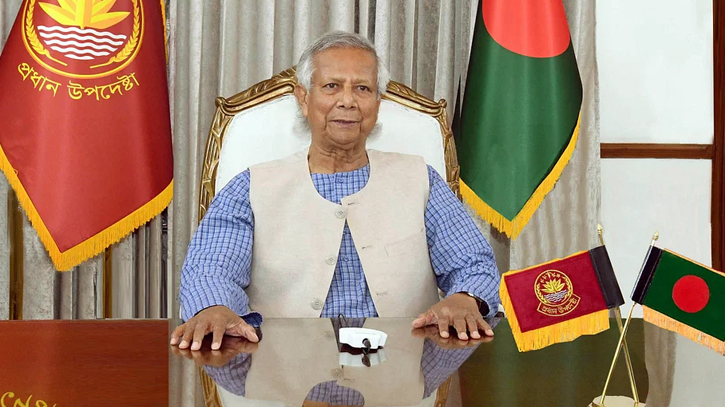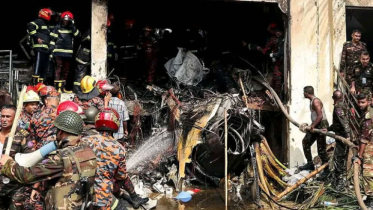
Dr. Mohammad Yunus. Photo: Collected
Political parties are increasingly anxious about the timing and framework of the upcoming 13th National Parliament election. Discussions with the interim government, led by Dr. Mohammad Yunus, are ongoing, and several parties, including the Bangladesh Nationalist Party (BNP), are applying pressure through public speeches and seminars demanding a clear electoral plan.
The interim government under Dr. Yunus is navigating a complex landscape of political pressures and reform requirements. The focus remains on establishing a fair electoral process through essential reforms, with the possibility of delaying the elections until 2027 to ensure these changes are thoroughly implemented. The political parties, while pushing for a faster resolution, are engaging in ongoing dialogues to shape the future of Bangladesh's democratic process.
Dr. Yunus and his interim government, which took office following the tumultuous period under the previous administration, have signaled that their primary focus is on ensuring a fair and broadly accepted election. According to reliable sources within the interim government, Dr. Yunus' administration is committed to not extending its tenure beyond what is absolutely necessary. However, it is clear that the interim government intends to address several critical reforms before proceeding with the election.
Sources close to the interim government have indicated that the 13th National Assembly elections might be delayed until 2027. This postponement is attributed to the need for substantial reforms in several key areas. The interim government has identified four main sectors that require urgent attention: the electoral system, law and order, public administration, and judicial reform. These areas have been notably undermined by the previous authoritarian regime led by Sheikh Hasina, leaving a legacy of dysfunction that must be addressed to ensure a free and fair electoral process.
The interim government has outlined its strategy to tackle these issues. Among the immediate steps is the reorganization of the police force and the reconstitution of the Election Commission. These changes are deemed crucial for restoring public trust in the electoral process. Additionally, reforming the judiciary is seen as essential for ensuring impartial and transparent legal proceedings.
A detailed roadmap for the elections is expected to be prepared within the current month. This roadmap will include the formation of a committee responsible for revising the constitution, which will address the tenure and role of Dr. Yunus' interim government. The committee's decisions will have a significant impact on the timeline for the elections. It is anticipated that the interim government's term may extend up to three years, given the complex and extensive nature of the necessary reforms.
However, they are prioritizing significant reforms to address the issues that triggered recent student-led protests. As a result, the 13th National Parliament election may be postponed until 2027.
According to these sources, fundamental reforms are essential before holding the elections. Key areas include reorganizing the police force, reconstituting the Election Commission, and making changes to the judiciary. These reforms are crucial for ensuring a free and fair election. Consequently, the Dr. Yunus-led government is focusing on critical sectors such as the electoral system, law and order, public administration, and judicial reform, all of which have been compromised under the previous government led by Sheikh Hasina.
The detailed plan for the election is expected to be outlined within this month. A committee will be established to review and amend the constitution, including provisions for the interim government led by Dr. Yunus. It is anticipated that the term of the interim government could last up to three years to adequately address the necessary reforms. The new constitutional provisions may also affect the eligibility of political leaders for the prime ministerial role.
On August 29, BNP held a meeting with Dr. Yunus at the State Guest House Yamuna to discuss state reform and national elections. Dr. Yunus’s chief adviser assured that a roadmap for these issues would be presented within the month. The interim government has been engaged in discussions with various political parties from last Thursday to Saturday, emphasizing that reforms to the Election Commission, administration, and law enforcement are underway to facilitate a fair election.
Prior to this, on August 8, a meeting was held with BNP Secretary General Mirza Fakhrul Islam Alamgir, along with other political parties including Jamaat-e-Islami. The discussions have intensified the focus on election-related issues.
Mirza Fakhrul Islam Alamgir expressed his frustration, stating that a clear roadmap for the elections had been requested for some time. He noted that while the Chief Adviser indicated that the roadmap would be a political decision requiring further discussions, the BNP emphasized that the interim government's primary objective should be to organize elections post-reforms.
Syed Muhammad Rezaul Karim of Charmonai urged the Chief Adviser to expedite the creation of an election environment and provide a clear roadmap for the elections. He stressed the urgency of holding elections before public dissatisfaction escalates, highlighting the need for a secure and fair voting environment that was lacking in the past.
Messenger/Disha








